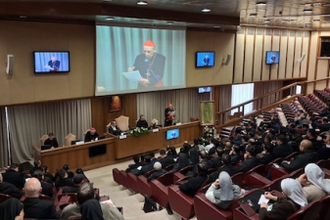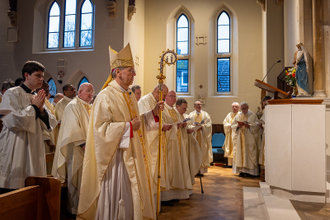China: Academic conference on philosophy of St Thomas Aquinas

Image: Fides
Source: Fides
'Openness, inclusiveness, innovation, rationality' and many other characteristics of the philosophy of Saint Thomas Aquinas (1225-1274) were the focus of the 'Fifth National Forum on Medieval Philosophy', during which Chinese academics and clergy met to discuss the 'Doctor Angelicus' on the occasion of the 800th anniversary of his birth.
The symposium took place on 8 and 9 June at the Huazhong State University of Science and Technology (HUST) in the city of Wuhan, capital of Hubei Province.
During the two days of the conference, more than 70 scientists and experts from around 30 universities from mainland China, Hong Kong, Taiwan and Macau gave lectures and took part in high-level academic debates. The universities and institutes from which the participants of the symposium come also include Peking University, People's University, Xinjiang University, Chinese Academy of Social Sciences, Fu Jen Catholic University in Taiwan, Chinese University of Hong Kong and St Joseph's University in Macao.
On the occasion of the 800th anniversary of the birth of the 'Great Sage of Philosophy' (as Saint Thomas Aquinas is known in the Chinese academic world), Wu Tianyue, Secretary General of the Professional Committee of Medieval Philosophy of the National Institute of Philosophy and Professor at Peking University, opened the symposium with a lecture on '800 Years of Thomas Aquinas: Thomism in Historical Context'. Professor Wu also gave an overview of all the research and studies carried out by the Committee during the Jubilee Year of Saint Thomas, focusing in particular on the publication of a new Chinese translation of the 'Summa Theologiae', one of the major works of Saint Thomas Aquinas, under the auspices of Huazhong University.
Several representatives of the Catholic Church in China also participated in the symposium. Rev Peter Zhao Jianmin, a priest of the Archdiocese of Beijing, gave a lecture entitled 'Scholastic philosophy and its historical repercussions'. Professor Li Qiuling, PhD supervisor at the Institute of Philosophy of People's University and researcher at the Institute of Theory of Buddhism and Religion, devoted his lecture to 'the specific contribution of Christian philosophy'; Taiwanese philosopher Bernard Li Jianqiu, former rector of Fu Jen Catholic University, focused on 'the intellectual development of Saint Thomas.'
Several papers referred to the anthropology and metaphysics of Saint Thomas Aquinas; other papers explored and deepened topics such as the relationship between Greek philosophy and the Church Fathers and the theological epistemology of Thomas Aquinas.
During the forum, participants discussed historical studies and research on the current development of the philosophy of St Thomas Aquinas, with a view to a broader debate on the contribution of medieval philosophy in the current historical context marked by multiculturalism. In addition, the scholars recalled the urgency of dealing with philosophical themes and questions in an understandable language, in order to arouse curiosity and interest in the topics discussed even among those who have never studied philosophy.


















